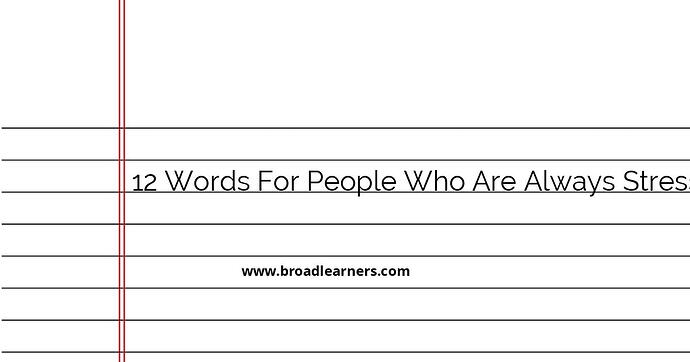Stress is a common experience that many people face on a daily basis. Some individuals seem to be constantly stressed, unable to relax or find peace of mind. If you're looking for alternative words to describe people who are always stressed, here are twelve options:
- Anxious
- Tense
- Worried
- Stressed-out
- Frazzled
- Overwhelmed
- Panicked
- Agitated
- Nervous
- On edge
- Hyperactive
- Restless
Each of these words conveys the state of being consistently stressed and can be used to describe individuals who experience chronic stress. Let's explore each word in further detail:
1. Anxious
Someone who is anxious is constantly feeling unease, apprehension, or worry. They may have a persistent sense of nervousness or fear, even in situations where others might not find them threatening.
Example: Sarah is always anxious, worrying about every little detail and constantly anticipating the worst outcome.
2. Tense
A tense person is frequently in a state of mental or emotional strain. They may have a rigid body posture and appear tightly wound, unable to relax or let go of stress.
Example: Tom is always tense, his muscles are constantly clenched, and he seems unable to unwind even in moments of rest.
3. Worried
Someone who is worried is consistently concerned or troubled about actual or potential problems. They may be preoccupied with negative thoughts and find it difficult to focus on anything else.
Example: Emily is always worried about her job security, constantly thinking about what could go wrong.
4. Stressed-out
A person who is constantly stressed-out is consistently overwhelmed or under pressure. They may exhibit physical and emotional signs of stress, such as irritability, difficulty sleeping, or frequent headaches.
Example: Michael is always stressed-out, constantly juggling multiple responsibilities and deadlines.
5. Frazzled
Someone who is frazzled is constantly mentally or physically exhausted, often due to excessive stress. They may appear disorganized, forgetful, or unable to focus.
Example: Lisa is always frazzled, forgetting important tasks and constantly feeling overwhelmed with her workload.
6. Overwhelmed
A person who is overwhelmed is constantly feeling overburdened or unable to cope with their responsibilities. They may feel like there is too much on their plate and struggle to prioritize or manage their tasks.
Example: John is always overwhelmed, constantly feeling like he's drowning in work and responsibilities.
7. Panicked
Someone who is panicked is constantly in a state of extreme fear or anxiety. They may have a sense of impending doom and be unable to think clearly or make rational decisions.
Example: Samantha is always panicked, reacting with fear and anxiety to even minor challenges or uncertainties.
8. Agitated
An agitated person is consistently in a state of irritation, restlessness, or unease. They may have difficulty sitting still, experience racing thoughts, or exhibit fidgeting behaviors.
Example: David is always agitated, constantly fidgeting and unable to find a sense of calm.
9. Nervous
Someone who is nervous is constantly experiencing feelings of apprehension, worry, or unease. They may have physical symptoms like sweaty palms, a racing heart, or butterflies in their stomach.
Example: Jessica is always nervous, fretting over small details and constantly second-guessing herself.
10. On edge
A person who is constantly on edge is consistently tense, anxious, or easily startled. They may have a heightened sensitivity to perceived threats and be constantly vigilant or watchful.
Example: Alex is always on edge, jumping at the slightest noise and constantly looking over his shoulder.
11. Hyperactive
Someone who is hyperactive is constantly in a state of excessive activity, restlessness, or agitation. They may have difficulty sitting still, constantly fidget, or engage in impulsive behaviors.
Example: Jenny is always hyperactive, unable to stay focused for long periods and constantly seeking stimulation.
12. Restless
A restless person is consistently unable to relax or find peace of mind. They may feel a constant need to be moving or doing something and have difficulty staying still or quiet.
Example: Mark is always restless, constantly pacing back and forth and unable to sit down and relax.
These twelve words provide alternative ways to describe individuals who are always stressed. Each word captures a specific aspect of the experience, helping to paint a clearer picture of their consistent state of stress. Remember, chronic stress can have negative impacts on physical and mental health, so it's important to support individuals who are dealing with constant stress and help them find healthy coping strategies.
Did I miss anything? Respond below
